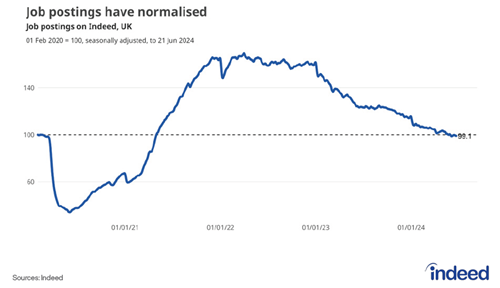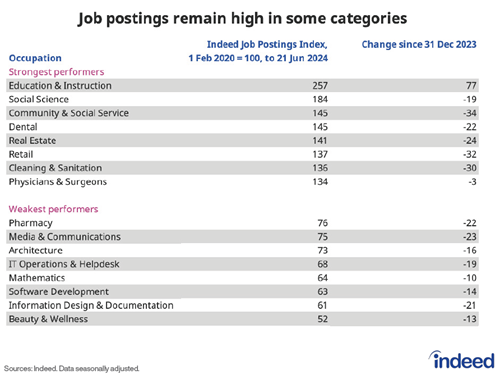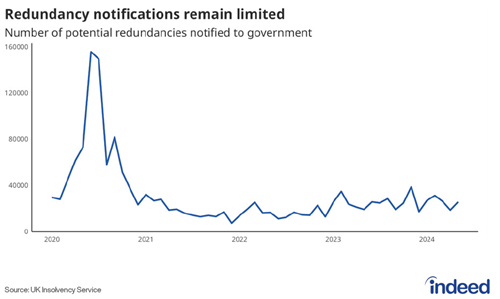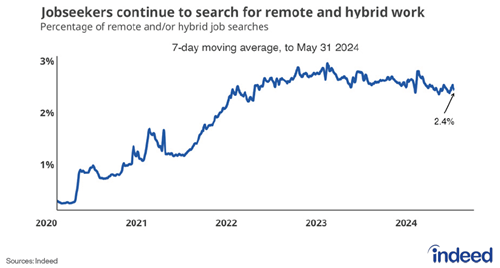Oxfordshire Recruitment Market Overview, July 2024

Read our Oxfordshire recruitment market overview for July 2024. Analyse hiring trends and get the most accurate recruiting advice for employers in Oxfordshire.
Oxfordshire Recruitment Market Overview July 2024
Compiled by Allen Associates with data insights and analysis by Indeed Hiring Lab
Download PDFHiring trends and what they mean for employers
As we look ahead to the second half of 2024, many employers will be watching to see what happens to interest rates and inflation before they make their next move. They will also be horizon scanning, waiting for a clear signal to go for growth.
Ongoing economic and political uncertainties in the first half of the year continued to affect business confidence with many employers remaining cautious about taking on permanent staff unless they could make a strong case for it. This resulted in an uptick in temporary hires as employers took interim steps to cover absence and spikes in workload.
Although the number of job vacancies continued to decline in the first half of the year, this fall slowed in the second quarter as employers showed signs of renewed optimism. Job postings on the UK’s biggest jobs board, Indeed, reached ‘normal’ pre-pandemic levels in June, reflecting a long period of readjustment after the unprecedented peak in demand seen in May 2022.
Oxfordshire shows a similar trend to the national one, with job postings well down from the peaks but still 4% above their pre-pandemic baseline.

Labour market impact
As ever, the picture varies across the different job categories, with postings remaining particularly high in some areas. The education sector saw the greatest number of vacancies in 2024 at more than double their pre-pandemic level. This is notable in Oxford which has a large proportion of educational establishments and suppliers to the sector.
At the other end of the spectrum, beauty and wellbeing, and technology, posted the fewest job openings.

Strong wage growth
The latest ONS figures show that pay growth remained strong at 6% for regular pay (excluding bonuses) in the three months to April. Annual growth adjusted for inflation was 2.3% which is good news for workers who will be starting to feel the benefit.
Year-on-year wage growth seen in job postings on Indeed rose to a four-month high in May at 6.5%.
The strongest wage growth continues to be seen in lower-paid categories including childcare (8.6%), cleaning and sanitation (8.5%), security and public safety (8.5%), loading and stocking (8.2%), retail (8.1%) and hospitality and tourism (8.0%) – impacted by the large increase in the National Minimum Wage which came into effect in April.
How is this impacting the labour market?
According to the ONS, unemployment levels rose to 4.4% in May 2024 which is higher than in previous years but still low when compared to historic figures. Employment numbers also remained robust with the number of employees on payroll well above pre-pandemic levels.
Another sign of the labour market’s resilience is that job losses haven’t increased this year. The number of potential redundancies notified to the government has remained within a stable range and that trend looks set to continue.

The ratio of unemployed people to job vacancies stands at 1.7 up from a low of 1 in mid-2022 but below its average of 2.9 since 2001. This suggests a slight easing in the labour market but overall, candidate availability remains tight and employers may still be struggling to attract the people they need.
One of the big issues of our time is the high number of people in the UK who are economically inactive. There are around 9.3 million people out of work (883,000 more than before the pandemic), with long-term sickness being one of the main reasons for the increase. Long NHS waiting lists have been partly blamed for the delay in getting people back to work.
Neil Carberry, Chief Executive at the Recruitment & Employment Confederation (REC) believes the newly-elected government will need to act quickly to address the UK’s labour supply challenges or risk a £39 billion annual cost to the economy. The REC is calling for a workforce plan which tackles the current challenges, including lowering barriers on skills, supporting infrastructure such as childcare and transport, regulation, immigration and tax.
Trends to look out for in the second half of 2024
Pay transparency is high and rising
Over three-quarters (78%) of UK job postings now include some form of wage or salary information and that trend is set to continue. This is a win-win for employers and for candidates, addressing salary expectations up front and helping to ensure that relevant and interested candidates apply.
Research shows that jobs that don’t advertise remuneration attract less quality applicants than those that do. With the most qualified candidates in high demand, employers are advised to be transparent about pay to remain competitive and save time and potentially disappointment further on in the process.
Flexibility remains key to candidate attraction
With the labour market still reasonably tight and quality candidates highly sought-after, flexibility remains key to candidate attraction. The majority of candidates applying for roles in sectors that are conducive to flexible working, now expect this as standard. Employers that don’t take a flexible approach will struggle to compete in today’s market.
Around 15% of job postings on Indeed mention remote or hybrid work and this has remained steady over the last couple of years even though some employers are keen to encourage as many people back to the workplace as possible.
Jobseeker interest in remote and hybrid work shows no sign of fading either. Around 2.4% of searches contained remote/hybrid terminology as of the end of May, with this share having remained fairly stable over the past couple of years.

Four day working week
Four-day work weeks remain a niche part of the labour market and are most often seen when remote and hybrid work isn’t feasible. It currently accounts for just 0.8% of employer job postings, with categories such as veterinary, childcare and dental seeing the highest share, although this trend is gradually rising.
Recruitment advice for Oxfordshire employers
The team at Allen Associates have been recruiting for temporary and permanent jobs in Oxford at all levels in PA and Admin, HR, Marketing and Finance for more than 25 years, and are ideally placed to provide an overview of the local jobs market and hiring trends.
Reflecting on the first half of 2024 and looking ahead to the rest of the year, Kate Allen, Founder and Executive Chairman, at Allen Associates said:
“Employers have continued to find the market complex and challenging but there are signs that some of the pressures they have been grappling with are starting to ease.
“The labour market is opening up a bit more with some really great candidates available but it is still very competitive out there and employers can’t afford to be complacent. We realise it’s a tough balancing act as employers want to get it right and appoint the best person for the role – ideally on their terms. And that’s where negotiations sometimes fall down as there can be a mismatch in expectations between what employers want and candidates need.
“This is not a new thing but the narrative does seem to have shifted somewhat, with candidates insisting on flexible working and employers not always willing or able to meet their needs.
“With wage growth remaining high and employers increasingly developing their benefits packages to be as appealing as possible, it’s clear that many of our clients are keeping a close eye on the competition. Speed and compromise will be essential in the second half of 2024 as more vacancies open up and demand rises.”

Eleanor Bromage, Managing Director at Allen Associates, added:
“Flexible working remains firmly at the top of most candidates’ list of requirements, followed by opportunities for personal development and career advancement. Candidates are also ever-more interested in working for organisations with people-focused policies and strong community or ethical commitments, rather than purely profit-orientated.
“We are also seeing more senior-level candidates – either applying for the top jobs or roles that they are over-qualified for as they seek out a change in lifestyle or direction. Head of HR and senior-level finance roles are in demand, as are marketing communications and digital content roles.
“Our advice to our clients is always to be open and flexible – and to act quickly and decisively when an exceptional candidate comes along. Consider candidates with transferable skills and offer flexible working. In our experience, the most successful hires are made when employers forge a partnership with us and trust us to work exclusively on their role to achieve the best outcome.”

Key features of the Oxfordshire recruitment market
The following summary has been compiled by Allen Associates based on their first hand experiences of working with candidates and clients on business support roles across Oxfordshire.
- Candidates want to work flexibly and most want to be able to work from home for at least some of the week
- There are more experienced candidates looking for senior-level roles or jobs that they are over-qualified for
- The number of candidates looking for PA and Admin roles is increasing
- Employers often ask recruitment agencies for help when their own hiring attempts have been unsuccessful or they have niche, hard-to-fill vacancies
- Employers that are dealing with entry level or low skilled roles themselves are being inundated with poor quality, unsuitable applicants, making shortlisting difficult and time consuming for over-stretched managers
- Retention continues to be a core focus with employers investing more in upskilling and developing their people
- Employers are no longer so insistent on specific sector experience but are more open to training strong candidates with the relevant skills and who will be a good cultural fit
- Oxfordshire employers are still actively recruiting – they are just more focused than ever on finding the right candidate
What are Oxfordshire employers looking for in their new hires?
- Skillsets that add value and enhance existing teams
- Education and qualifications
- Technical/IT skills in particular
- Specialists rather than generalists
- Excellent soft skills
- Demonstrable knowledge and understanding of their new employer’s business
- Loyalty and commitment
- Ability to hit the ground running, adaptable and agile
What are candidates looking for from their new employers?
- Competitive rates of pay
- Flexibility
- A good work-life balance
- Autonomy and trust
- Career and personal development opportunities
- People-centric policies and a supportive culture
- Organisations with CSR and ESG credentials that are committed to ‘giving something back’
Hiring in Oxfordshire
If you’re looking for quality, pre-interviewed candidates for your business support roles in Oxford or elsewhere in Oxfordshire, we would love to hear from you!
Based in Oxford, Allen Associates has been matching great people to roles and employers for more than 25 years.
We apply the same rigorous recruitment process to our temporary and permanent vacancies so whatever your needs, you can be assured of an excellent service underpinned by passion, personality and integrity.
For support with your next hire, please call us on 01865 335600 or email hello@allen-associates.co.uk.
Useful contacts and more insights
Allen Associates runs monthly webinars on a wide range of people management topics led by guest speakers as well as quarterly Employment Law Updates with our legal partner, RWK Goodman. To find out more and register for these free events, please visit Allen Associates HR Hub.
The very latest data and insights on the UK labour market are available at Indeed Hiring Lab.
Recruitment industry news and information is available from the Recruitment & Employment Confederation (REC).
For more on the Oxfordshire economy, visit the Oxfordshire Local Enterprise Partnership (LEP).
Previous Oxfordshire Recruitment Market Overviews are available to download from Allen Associates Knowledge Centre.